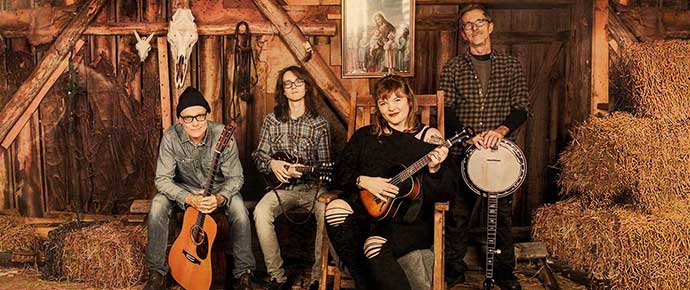
Although the band is based in Sweden, Mo’s Granted could be considered an international ensemble due to the fact that its lead singer, guitarist, and ukulele player Imogen Grant was born and raised in Canada before relocating to Scandinavia.
“Imogen moved to Sweden after some years of busking in the US and Canada,” bassist Peter Cedermark explains. “Word of her musicality reached Mikael Moilanen, who, at the time, was talking with his former bandmate and banjo player Kenneth Kjellgren about starting a new group. Kenneth and Mikael then contacted Jan-Olof Johnson, a former bandmate of Kenneth’s from Downhill Bluegrass Band. They engaged Jan-Olof’s son Gustaf on the mandolin, with Mikael initially playing the bass. In the summer of 2020, Kenneth asked me to try out as a bass player. I was between bands at the time, so in April 2021, I agreed to join the band.”
The band members also boast diverse musical backgrounds. Grant was trained in singing classical music. Johnson developed his skills as an arranger. His son Gustaf was originally a percussion major. Kejellgren is adept at recording and production, most of which he originates from his home studio. Cedermark, who occasionally doubles on banjo, also serves as a moderator for The Banjo Hangout, a premier website on everything banjo related.
That said, Mo’s Granted does coalesce together as far as style is concerned. “The sound is rooted in bluegrass and a high lonesome sound, but many elements are borrowed from blues, jazz, folk, and soul,” Cedermark explains. “In general, we retain the instrumentation and many other elements of bluegrass, such as hard-driving banjo, three part harmonies, and mandolin backbeat chops. Imogen sings in a soul/blues/jazz/bluegrass/folk style. Our live sets can include songs related to many different genres.”
It’s little wonder. Grant claims her primary influences derrive from Chris Stapleton, Nina Simone, Tom Waits, The Devil Makes Three, and Trampled by Turtles. “We borrow many elements from Flatt & Scruggs, Osborne Brothers, Tony Rice, and other bluegrass greats,” Cerdermark adds. “The basic style of a given tune is often dictated by Imogen’s interpretation, so we adapt the back-up to fit.”
Mo’s Granted’s first major live performance took place at the Torsåker Bluegrass Festival in July 2021. “This festival was special because the very last of the COVID restrictions were still in force, and the audience was limited to 50 visitors,” Cerdermark recalls. “We played two sets on two separate days and they were very well received. Our next major performance was at the Grenna Bluegrass Festival in August 2021. This time, it was completely without restrictions. It would also be a gig to be remembered. A wonderful crowd gave us standing ovations, and the promoters gave us two encores, despite an otherwise very tight schedule. That performance brought us to a wider audience. Then in July 2022, we revisited the Torsåker Bluegrass Festival after all restrictions had been lifted, and there again, we were very well received.”
Aside from their festival appearances, the band regularly performs at churches, for street and city festivals, and at private events.
“We have yet to do our first tour,” Cerdermark noted. “However, we’re applying to play at other festivals in and out of Sweden during 2023, and that may or may not evolve into a mini-tour. We absolutely love playing at bluegrass festivals, but we also hope to play at other festivals as well, including those that feature country and Americana so as to gain an even wider audience. We have made ourselves a name on the Swedish bluegrass scene, but that scene is fairly small and few of those bands are well known.”
Nevertheless, he says that the band has been welcomed warmly overall. “Our combination of traditional bluegrass instruments and a big, eclectic female voice is definitely not the norm,” Cerdermark suggests. “We play a fairly even 50/50 mix of originals and covers. Most original songs were written by Imogen and they relate to her life as a busker, her upbringing, her lost friends, and other personal stories. Kenneth wrote the tune Peaceful originally as an instrumental, but Imogen was inspired to add lyrics to it. The band recently picked up one of my original songs and we expect to perform it live in 2023.”
He says songs such as If It Hadn’t Been For Love and Blue Side of the Mountain by The Steeldrivers are among their favorite covers, while adding that Grant’s affection for Nina Simone comes through in a medley of Don’t Let Me Be Misunderstood and House of the Rising Sun.
“We try to create our own renditions using our own strengths and skills, rather than recreate versions already out there,” he adds.
The band’s recordings include a 2021 EP titled Session One, as well as three singles written by Grant herself — You Can Tell I’m Sweet and My Superhero Mother — both released in 2021 — and The Booze, which came out from earlier this year. This past month, they shared a cover of a traditional Christmas song titled Blind Boys of Bethlehem. Cedermark added that further recordings are planned for 2023.
Asked his opinion on why bluegrass enjoys such international popularity, Cedermark said that in his opinion it has to do with three primary factors.
“I’m thinking about the classic song form with intro, verses, choruses, and ending based on three main chords,” he continues. “It’s easy to recognize and follow for musicians and audience alike. The audience is never left behind, and it leaves lots of headroom for instrumental and vocal virtuosity and expression. I also think the storytelling should not be understated. The story is often the most engaging part of the song, and the focus on the story is almost unmatched compared to jazz, choir music, or other genres. A good story engages in a way that music alone can’t. Finally, the openness and accessibility of the bluegrass community is something very special.”
Notably, Cedermark bases his opinion on personal experience.
“I still remember my first bluegrass festival, seeing the other bands camping and jamming together with everyone else,” he recalls. “Any sense of being starstruck quickly disappeared. Beginners could pick up the songs fairly quickly, and they were encouraged to take solo breaks, suggest tunes and join in. This was my first contact with the jamming culture, and the openness was fantastic. Of course, being able to play the bass made me feel especially welcome.”







